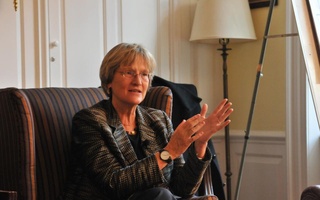A month after Congress passed a budget easing federal research funding cuts that had gone into effect in early 2013, Harvard administrators said last week that while research prospects may be looking up, the future remains uncertain for scientific research.
“They all will say there has never been a more exciting time to pursue science, and at the same time, there is a time of concern about support from the federal government and other sources to pursue that work,” said Kevin Casey, Harvard’s associate vice president for public affairs and communications and the University’s top lobbyist in Washington, D.C.
In January, Congress passed a budget package that provided some relief from the effects of sequestration for the 2014 fiscal year. Casey said that “even with this budget deal, we have not returned to where we before.”
Sally J. Rockey, deputy director of extramural research at the National Institutes of Health, agreed, saying that the decline in research funding is “quite difficult for organizations like Harvard, while the NIH budget is flat and the cost of research continues to rise.”
Between 1998 and 2003, the NIH budget more than doubled, growing from about $13 billion to about $27 billion. Since 2010, however, the budget has fluctuated between about $27 billion and $31 billion. In 2013, the NIH had the lowest grant success rate in history and lost $1.5 billion due to sequestration cuts.
Casey said that NIH funding “comprises over 70 percent of the federal research base at Harvard and a larger percentage at the School of Medicine and School of Public Health.”
From 2012 to 2013, Harvard Medical School lost $19.3 million in federal expenditures and the Harvard School of Public Health lost $8.2 million. Harvard received more than $650 million in federal research sponsorship in FY 2012, before sequestration took effect.
University Provost Alan M. Garber ’76 said that “for Harvard as an institution, the consequences are varied.”
Recommended Articles
-
Research Funds Cut Gives Scientists a Bleak YearMany Harvard scientists will have in effect up to 20 per cent fewer funds for this year's research projects. The
-
University Leaders Challenge NIH Funding DroughtLeaving their soil microbes and frozen mice ears behind for a day, a dozen Harvard scientists headed for Washington D.C.
-
Faculty Anticipate Science Research Funding from Obama Stimulus PackageThe two-year clock has started ticking, and $21.5 billion from Obama’s stimulus package must be spent on research and development
-
 Professors, University Decry 'Devastating' Trump Budget Proposal
Professors, University Decry 'Devastating' Trump Budget Proposal -
 Spending Bill ‘Bodes Well’ for Research Funding, Faust Says
Spending Bill ‘Bodes Well’ for Research Funding, Faust Says













